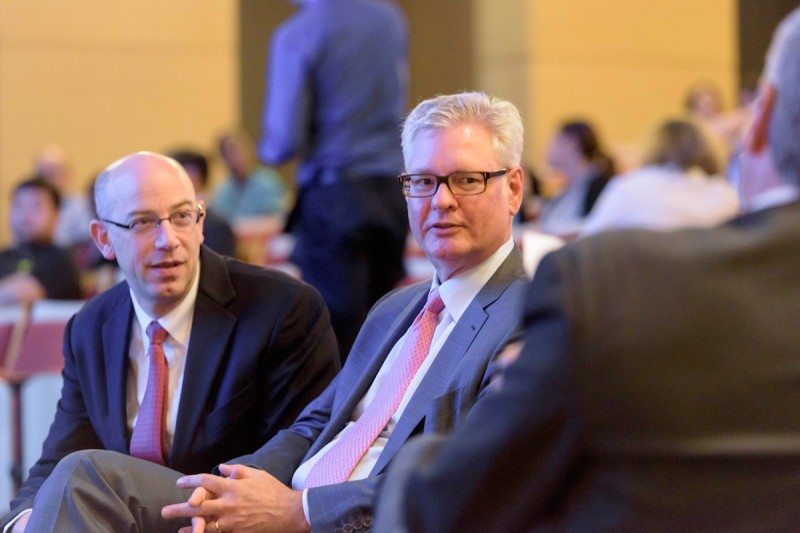
Charles Rudin (left) and David Jones lead the Druckenmiller Center.
The statistics are stark: Each year, more people die of lung cancer in the United States than colon, breast, and prostate cancers combined. Equally alarming, approximately 20% of cases are now being diagnosed in people who have never smoked. Despite progress in understanding lung cancer and treatment advances, major challenges remain.
The recent creation of the Fiona and Stanley Druckenmiller Center for Lung Cancer Research marks a major step in solving these problems. Made possible by a commitment of $25 million from MSK Board member Stanley Druckenmiller and his wife, Fiona — the Druckenmiller Center brings together physicians and scientists in an intensive, multidisciplinary enterprise that builds on Memorial Sloan Kettering’s long history of achievement in thoracic oncology. This gift is one of many Mr. and Mrs. Druckenmiller have made to a range of organizations and causes, including previous contributions to MSK. Mr. Druckenmiller, the former chairman and president of Duquesne Capital, has been a member of MSK’s Boards of Overseers and Managers since 1997.
MSK’s Chief of Thoracic Oncology, Charles M. Rudin, and Chief of Thoracic Surgery, David R. Jones, will lead the Druckenmiller Center. The overarching goals are to expand the understanding of the biology of lung cancer through basic-research discoveries, examine novel treatment strategies in preclinical models of lung cancer, and ‘test promising concepts through clinical trials.
Dr. Jones has also been named the first incumbent of the Druckenmiller Chair in Lung Cancer Research. Dr. Rudin is the inaugural incumbent of the Sylvia Hassenfeld Chair in Lung Cancer Research, established by Alan Hassenfeld, former Chairman and CEO of Hasbro, to honor his late mother.
“It’s a critical moment to be on the forefront of tackling this disease,” says MSK President and CEO Craig B. Thompson. “Now, thanks to the generosity of the Druckenmillers, we can amplify our work in fighting lung cancer both in the clinical setting and the lab.”
Fostering Innovative Research
Druckenmiller Center investigators will lead research in a range of different and complementary areas. Annual grants to MSK scientists and clinicians who propose highly original lines of inquiry will support investigations into all aspects of lung cancer research and treatment. Funding will go to individuals as well as to collaborative efforts.
The Druckenmiller Center will also support the studies that go hand-in-hand with clinical trials — for example, correlating patient outcomes to provide insight into the interaction of drugs with their targets. The center will provide infrastructure support for translational research, including expansion of a tissue acquisition service to facilitate tumor specimen distribution to investigators.
A patient-derived xenograft program, led by Dr. Rudin, will allow researchers to use tumor tissue for preclinical testing of drugs. “By treating human tumors that we’ve transplanted directly into mice, we can get a very good idea about how a specific therapy is working,” he explains. While the program is still in the research phase, “if we find we’re getting a good response to a novel therapy, we aim to rapidly move it into clinical trials for patients whose tumors fit the same profile.”
Research will extend to surgery, including developing intraoperative imaging tools to improve surgical precision as well as advancing minimally invasive surgical approaches. The evolving role of radiation oncology in lung cancer will also have a place in the center’s portfolio. “We’ve moved beyond thinking about radiation as a stand-alone treatment,” says Dr. Jones. “We believe, for instance, that radiation may act synergistically with immunotherapies to enhance antitumor immune response, and we’ll be exploring that in lung cancer.”
Relationships across and beyond MSK
Dr. Jones observes “when appropriate, we’re enthusiastic about partnering with outside institutions so that together we can push investigations further and faster.”
“A critical element of the Druckenmiller Center is the integration of scientists from the Sloan Kettering Institute and MSK’s Human Oncology and Pathogenesis Program,” Dr. Rudin adds. “The value of having these scientists working with our clinicians can’t be overstated. We will foster relationships with an eye to developing new ideas and to generating support from other sources, taking some of the seed money provided by the Druckenmillers to catalyze additional external grants.”
“The Druckenmillers have provided a unique opportunity for us to continue to lead in innovation and discovery,” Dr. Jones concludes. “But we’re not going to beat this disease unless we hear from everyone. So whether you’re a scientist, a clinician, a nurse, a postdoc researcher, or a survivorship expert, you’ll have a place at the table.”



